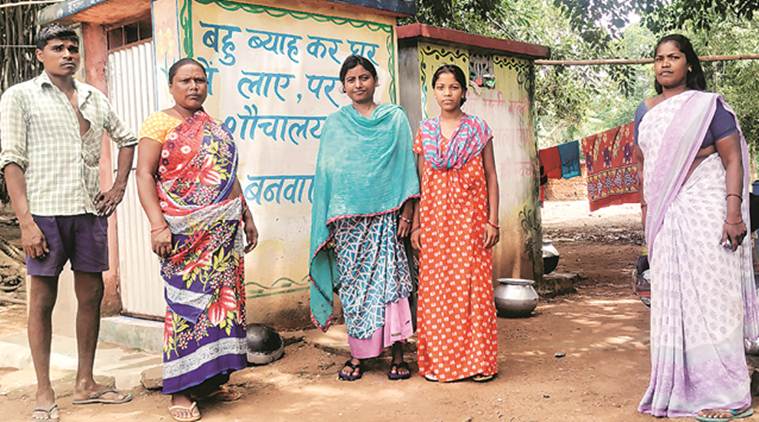- India
- International
This 30-year-old mother from Jharkhand braved abuse at home, doubts in her village to build toilets for all
One of 55,000 women masons behind ODF tag, Foolmani Devi is Jharkhand’s Swachh Bharat face
 Foolmani Devi (right) in Gutuatoli near Ranchi. (Express Photo: Abhishek Angad)
Foolmani Devi (right) in Gutuatoli near Ranchi. (Express Photo: Abhishek Angad)
Sukku Orain is relieved that she does not have to accompany her young daughters in the dark to the bushes near her home any more. Budhlal Munda says the memory of sitting out in the fields is now a thing of the past.
Orain and Munda are among the 400 residents of Gutuatoli village near Ranchi in Jharkhand who say that their “madam sahiba”, Foolmani Devi, has changed their lives forever. Devi, 30, heads a team of four women masons who have built 125 toilets in the village under the Swachh Bharat Mission.
The four are among the 55,000 Rani Mistris, or “empowered women masons”, trained under an initiative by the Jharkhand government’s Department of Drinking Water and Sanitation since 2017 to construct 15 lakh toilets under the flagship cleanliness programme. Jharkhand declared itself Open Defecation Free (ODF) last year.
In Gutuatoli, the change is visible not only in the smiles of residents but also in the life of Rani. She says she overcame constant beatings by her alcoholic husband and struggled to persuade her neighbours to avail the scheme, often carrying her two-year-old son on her back around the village for surveys to construct the toilets.
“Ever since I can remember, we had been going out in the open. But last year, I got a toilet of my own. Foolmani has struggled a lot for us to have a dignified life,” says Orain, 40, the mother of two daughters.

“Now, the other women here also to want to work like her. We hope the government starts more programmes like this to give more power to our women,” says Munda, adding with a smile that he no longer needs to go to the fields.
Recalling Devi’s struggle, Aradhana Patnaik, Secretary, Drinking Water and Sanitation Department, says progress was slow in the beginning as there were not enough masons to construct the toilets.
“After talking to a lot of stakeholders, we realised that women can be trained as masons. Soon, the word ‘Rani Mistri’ was coined. We trained and empowered them. It also helped achieve our ODF goal. Now, we are working towards ODF-plus, like improving sanitation, etc,” says Patnaik.
For Devi, the high point was when she received an award from Vice President M Venkaiah Naidu last September during the Jharkhand government’s “Swachhta hi Seva” function in Ranchi. She was also asked to deliver a speech on her work.
But that high, she says, came after several lows.
“I was married at the age of 16. And for years since then, I never stepped out of home. My husband did not like me talking to anyone and often abused me after getting drunk. After he met with an accident, the situation became worse,” she says.
“In 2017, the government was looking for women to construct toilets after which a self-help group was created. I was made the leader of the group in our village, which angered my husband even more,” she says.
“But I went ahead. I started carrying my younger son on my back to survey the number of toilets to be constructed. I used to return home very tired… and find my husband waiting at the gate, ready to beat me. I used to cry and break down. But the work I was doing gave me confidence… it made me happy, I carried on,” says Devi.
It was not just the beating — one day, her husband sold the sacks of cement she had stored in her home. “Another day, he broke my phone. That was when I decided to pack my bags and move to my neighbour’s house for 10 days to continue working,” she says.
“Every day, Devi used to start at 9 am and come back at 5 pm, noting down the designs for toilets, and the amount of construction material needed. I used to hear our neighbours talk ill about her behind her back. But she did not let any of that affect her,” says Vimal Munda, the neighbour who sheltered Devi.
Then, there was the “initial resistance from villagers”, who questioned Devi’s ability and that of her team — Dashmi Devi, Chalo Devi and Heera Devi. But with the government sanctioning Rs 12,000 for each toilet and the women masons charging Rs 2,100 per construction for their labour, the residents warmed up to the idea.
“Training was not easy… the design, construction material, the physical labour. Initially, we took help from a professional mason. After learning the basics, we constructed a ‘tedha medha’ (haphazard) toilet at first. But we were just so happy to have done something on our own. That feeling cannot be described in words,” says Devi.
Work picked up over the months, until a fresh setback this February. “My husband died and my elder son dropped out of school. I am in a bit of trouble, I need more support now. But I won’t give up. I hope to start constructing houses under the Pradhan Mantri Awas Yojana,” she says.
Apr 25: Latest News
- 01
- 02
- 03
- 04
- 05







































